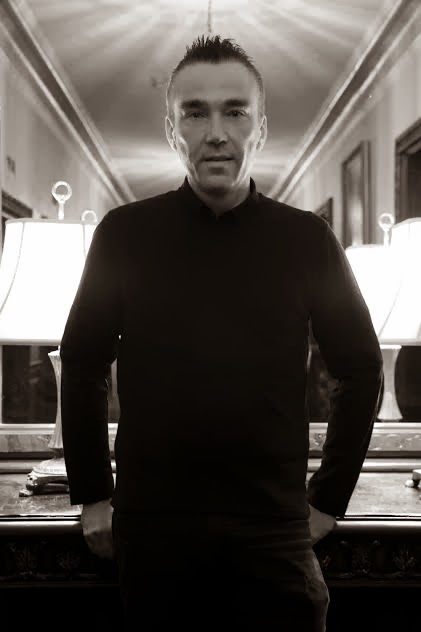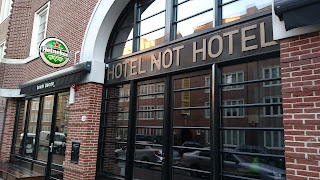Interview with Sam Baltrusis, author of "Ghosts of Boston: Haunts of the Hub"
In shamanic terms, ghosts are known to exist in the middle-world or our consensual reality here on Earth. They have either been trapped here or, according to shamanism pioneer, Michael Harner, are known as quasi-compassionate ethnocentric spirits who are "deceased persons" having "significant determination and power to remain in the Middle World to look after their surviving family members. They are typically the spirits of people who possessed considerable power during their lifetime but lost it, usually very late in life. The deceased person's power spirit usually lingers in the Middle World in haunts that had long been familiar to it." These spirits stay behind to watch over their family or kin and if you mess with their living relatives, they can be quite vindictive.
In Sam Baltrusis's 2012 book, "Ghosts of Boston: Haunts of the Hub," we meet a range of old and various spirits who have stayed behind, some for nostalgic reasons others trapped because of traumatic ones. What's great about this book, his first in a trilogy followed by Ghosts of Cambridge (2013) and the soon-to-be-released Ghosts of Salem, is that it's a biographical account not only of settlers from the 17th century onward but it also follows the life stories of many famous buildings in Boston proper, like the Omni Parker Hotel and CharlesGate East.
1.) This was a lively read that took the reader on a historical trail of folks who had met an untimely end in Boston proper. What historical lesson was the most poignant for you to learn about the Hub? Do you feel that you now perceive Boston in a totally different way after researching and penning this guide?
I've always been fascinated with the history of Boston. However, I didn't know much about the city's darker history. While writing my first book, I fell in love with the various "ghosts" of the city and many of them aren't the big names we associate with the Revolutionary War era, like Paul Revere, Ben Franklin and Sam Adams. As a journalist, it became my passion to dig deeper and to give a voice to those who were marginalized over the years. Women like "Goody" Glover, a Catholic woman executed for witchcraft, and Mary Dyer, a Quaker martyr who was also hanged because of her religious beliefs are important players in my first book.
The author posed in front of a mirror at the Omni Parker House that Charles Dickens would often use for his oration rehearsals when visiting Beantown. "I have noticed condensation on the mirror, as if somone was inhaling and exhaling, while shooting this photo," Baltrusis told Neptune Landing, adding "I have definitely had a few bizarre moments while giving tours in the Omni Parker House."
Before penning "Ghosts of Boston," I didn't know that the city was a major player in the 17th Century witch trial hysteria. In fact, we had several women who were executed and many who kept in horrid prison conditions and this was before 1692. Several of the victims accused in Salem were sent to prison in Boston. But no one talks about this. In fact, all of my books, including the upcoming "Ghosts of Salem," dig deep into the witch trial hysteria ... and it's heartbreaking.
2.) Although "Ghosts of Boston: Haunts of the Hub" is a historical guide, you obviously were touched by the subject matter in metaphysical ways. Care to elaborate? For how long have you felt the presences of certain people who had passed away? And how do YOU perceive their presences?
My books are historical-based ghost books. So, it's a great way to learn about the city's history whether you're a believer in the paranormal or not. But, yes, I'm what is known as a sensitive and I'm empathic to many of the "spirits" featured in my book. They have stories to tell and I feel like it's my job to give a voice to those without a voice (even though they're six-feet under). I've had this sensitivity most of my life and I talk about this sensitivity in "Ghosts of Cambridge" ... but I had so-called "paranormal blinders" in my 20s and 30s because encounters with ghosts terrified me. I drank a lot to deal with these residual emotions from past tragedies. When I moved back to Boston in 2007 and eventually got sober, I continued to have these experiences and something clicked ... I could approach the spirit world using a journalistic lens. So, I went from fear to determination. It was my job to get the facts right because there is so much misinformation out there regarding alleged hauntings.
3.) On at least two occasions in the guide, you write about how spirits are attracted to their homes and or hotels that happen to be well-preserved in this part of the country. Is there something about the New England living character that prefers to keep old structures rather than tear them down? Can you speak to this? Do you know why this is?
New Englanders are stubborn old birds [laughing]. It's a survival mechanism from the Puritan era, I believe, relating to the harsh winters in the region. This tough-cookie approach translates into the afterlife. Many of the spirits don't want to let go ... especially if they've built an empire, which is the case with Harvey Parker and his beloved Omni Parker House hotel. From a historical perspective, it's a goldmine as far as material. Boston holds on to its old buildings and this is why I love this part of the country.
4.) 2012 saw the publication of Ghosts of Boston. 2013 saw the publication of Ghosts of Cambridge. This year, we'll have Ghosts of Salem (lots of material there!). Do you see yourself investigating the ghouls of Provincetown for 2015?
Well, I'm currently writing "Ghosts of Salem." I can't give away too much, but there is so much misinformation out there regarding Salem and it's been tough, but exciting, digging for the truth behind years of lore that has been twisted over time. I produced a ghost tour in Salem this past season and a lot of the material in the book is coming from my unorthodox approach to the ghost tour. Yes, I've done tons of research on Provincetown and I truly love its historical back story. In fact, I originally planned to write a book on the town but my publisher assigned it to a different writer. I'm waiting to see, but I feel like I'm supposed to write a book on Provincetown at some point. In fact, I had an encounter with a Lady in White in Provincetown over New Year's which I'm taking as a positive sign.
5.) Did you ever find yourself overcome with sadness or sympathy in your line of work? How, if at all, do you commemorate the poor souls who you are writing about?
I'm extremely sensitive to the paranormal. In fact, I've given ghost tours and started crying because I feel connected to those who were unjustly tortured or have died tragically. For example, I was in tears researching at the Longfellow House while writing "Ghosts of Cambridge." Henry Wadsworth Longfellow's wife, Fanny Appleton, died tragically in the house and I can still feel her energy. There was so much love in that house ... and it continued even after her horrible death. In Salem, there's some lingering resentment for obvious reasons. My theory is that love can undo some of the residual pain and curses that continue to haunt the city. I'm rarely scared, but I have already experienced several close encounters with entities in Salem that aren't residual hauntings. Salem is extremely active ... and it promises to be a dramatic finale to my "Ghosts of" trilogy.
http://www.CambridgeUncommon.
http://www.SalemUncommon.com
Sam's books are available for purchase here through Powell's, an online and brick-and-mortar bookshop in Portland, Oregon.






Comments
Post a Comment